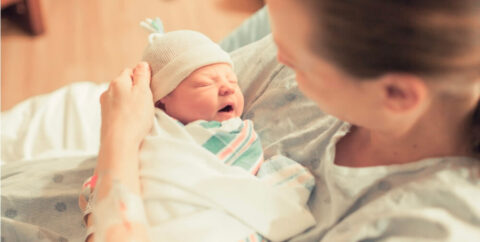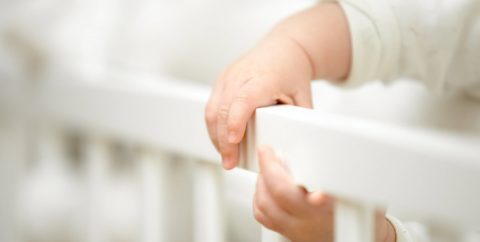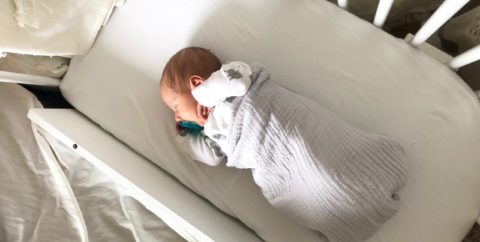3 Big Benefits of Co-sleeping with your Newborn

When was the last time you actually felt rested?
Can’t remember?
We totally get it. Those late-night feedings are exhausting, especially during the initial weeks after giving birth.
Imagine how rested you’d feel if you didn’t have to get out of bed every 2-3 hours to feed or soothe your newborn.
No more tip-toeing your way back to the crib, praying not to wake your baby.
No more frustration when, you finally find a comfortable position, only to be woken up moments later.
…sounds too good to be true, right? Not anymore.
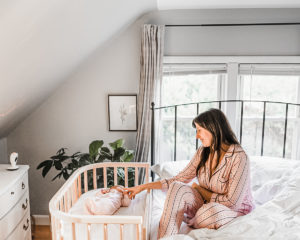
Parents all over the world have started getting the sleep they desperately need by switching over to babybay’s Baby Bedside Sleeper.
Uniquely engineered to lock into beds of all sizes and heights, this co-sleeper is changing the game.
Now, you can enjoy all the benefits of co-sleeping, and the closeness of bedsharing, without compromising safety.
CO-SLEEPING ENCOURAGES DEVELOPMENT
James J. Mckenna, Director emeritus of the Mother-Baby Behavioral Sleep Laboratory at the University of Notre Dame, found that,
“Parents serve as a kind of biological “jumper cable,” or outsourced regulator, to a newborn baby when she is completing her gestation outside her mother’s body. When parents and babies sleep together, their heart rates, brain waves, sleep states, oxygen levels, temperature, and breathing influence one another.”
In basic lingo, this means, your baby’s development relies on being close to you. Even outside of the womb, our bodies sync together for prime developmental functioning. The separation that comes from a stand-alone crib can get in the way of this.
Does this mean you have to stay joined at the hip? No. But, it shows that simply sleeping nearby makes it possible for them to grow big and strong. Amazing, right?
THE CLOSER YOU ARE THE LESS ANXIETY FOR EVERYONE
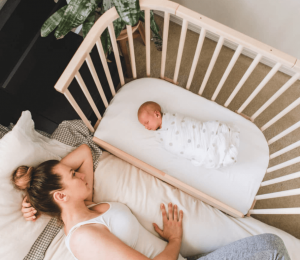 Hearing the beating of your heart and the in and out of your breath can be incredibly soothing to your baby. Depriving them of this for 6-8 hours at night means babies cry more often, needing your closeness to soothe their anxiety.
Hearing the beating of your heart and the in and out of your breath can be incredibly soothing to your baby. Depriving them of this for 6-8 hours at night means babies cry more often, needing your closeness to soothe their anxiety.
Babies who co-sleep generally cry less, wake less often, and allow you to sleep for longer periods of time.
Added Bonus: You get to wake up next to a smiley baby!
YOU CAN BETTER RESPOND TO A CRISIS WHILE CO-SLEEPING
Parenting guru Dr. Sears found during his studies that:
“Babies who sleep close to their mothers enjoy ‘protective arousal,’ a state of sleep that enables them to more easily awaken if their health is in danger, such as breathing difficulties…Infants who sleep near their parents have more stable temperatures, regular heart rhythms, and fewer long pauses in breathing compared to babies who sleep alone. This means the baby sleeps physiologically safer.”
When it comes to defending against dangers to your baby, there is no substitute for your care. Co-sleeping makes it possible to familiarize with all the sounds your baby makes.
As part of your natural-momma-bear instinct, (part of the physiological syncing mentioned above,) your body stays alert even while sleeping. If something is off, you can count on your body to sense it — and, in the event of an emergency, this can make all the difference for the safety of your baby.
The babybay Baby Bedside Sleeper is a leader in safety for co-sleeping with newborns. All of our sleepers undergo rigorous safety inspections, and must receive domestic and international safety certifications before ever going out to you.
If you’re ready to start getting a better night’s sleep, with less stress, and more opportunity to connect with your baby then, it’s time you meet our bedside cribs. 90% of the world’s families are already co-sleeping their way to better nights. Isn’t it time you expected more for your family?
Meet the babybay co sleeper cribs
